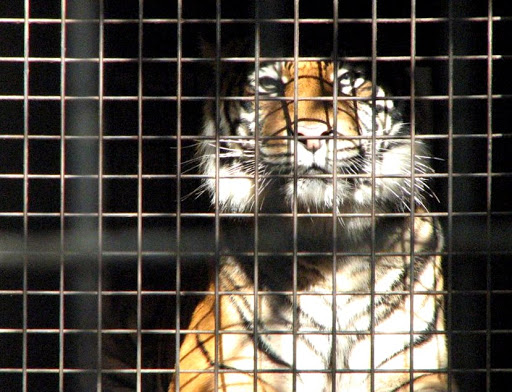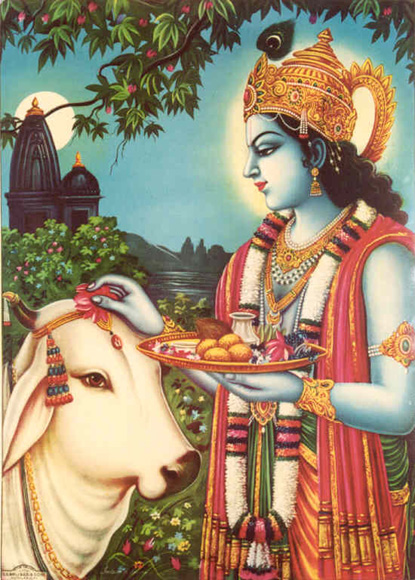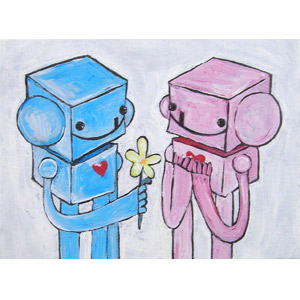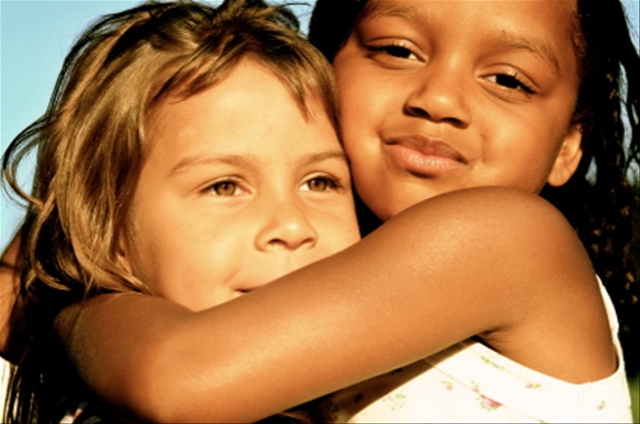So what is the difference? What is the intangible essence of being that animals posses which we do not, and cannot define? If they don’t see the world through our lens of reason, what lens do they see it through? Instinct? Survival? Or something else entirely? Costello uses the example of poets Rilke and Hughes, their attempts to posses, or be possessed by, the being of animals; to capture the feeling, the being, the perception of a beast. Both poets recognize a will of animals, a will that powers their being, which asserts itself in their movements and in their very presence. We cannot describe what powers this will of animals, but, as in Rilke’s poem, we can determine what breaks it. In the cage, the panther exists, and continues to move, yet, “inside, a gigantic Will stands stunned and numbed (Rilke, anthology, 372).” Costello describes it as this, “a concentric lope that leaves the will stupefied, narcotized (Coetzee, 95).” So perhaps an animal’s will comes from its freedom of movement – its existence in space, in nature, from where it draws all its stimuli and channels all of its responses. Because if an animal’s perception is not contained within the frame of its own mind, within a network of reasoning and deduction, it must be free to exist outside of the mind, to move with what is being perceived – as Costello says, “his consciousness is kinetic rather than abstract (Coetzee, 95).” Does this mean animals have a greater ability to project into their environments? To have a confidence, and assertiveness, of movement and of being that is limited by the human need for rational order, fo
 r cognition over impulse? We cannot know, because of that very limitation. To get close to how animals feel and think, we must let go of the backbone of our consciousness – reason – and feel blindly, as Costello describes, “Hughes is feeling his way towards a different kind of being-in-the-world (Coetzee, 95).”
r cognition over impulse? We cannot know, because of that very limitation. To get close to how animals feel and think, we must let go of the backbone of our consciousness – reason – and feel blindly, as Costello describes, “Hughes is feeling his way towards a different kind of being-in-the-world (Coetzee, 95).”An affront to the will of animals, confinement.
http://lh5.ggpht.com/yoni.alon/R0ljYgnFTNI/AAAAAAAAATA/KGbSY34AE7Y/76a80e6e_SAFARI2520033.jpg
http://lh5.ggpht.com/yoni.alon/R0ljYgnFTNI/AAAAAAAAATA/KGbSY34AE7Y/76a80e6e_SAFARI2520033.jpg
What drives poets to want to capture the mystery of animals? Is it the same thing that draws people to zoos? That creates an audience for programming devoted solely to documenting animals in their natural state? We recognize the mystery in the lives of animals, just as we recognize the mystery of the cosmos, and so we seek to explore it further, we are engaged, fascinated by that mystery. One would think that the idea of animals containing some force that we don’t know about would be a concession to their equality with humans, and yet we continue to treat them as inferiors. This is the contradiction that comes with our fascination – we see the beauty, the mystery, the magnetism of animals; and yet we destroy them, thoughtlessly.
This destruction has not always been a contradiction. Costello makes the case for primitivism, as addressed by poets such as Hughes. Primitivism is a celebration of the animal, “a contest, a ritual, and honour (Coetzee, 97).” When we must face the creature we are about to destroy, match it in physical strength and dexterity and reaction (a cognitive prowess), we are conceding to it an equivalence, making it something that must be earned, that is not ours by right, not innately inferior. We destroy animals not because we have contempt for their existence, but because we recognize the power and the sustenance they give us. If this were how we got all of our meat, by matching ourselves against animals in their natural state, by earning their destruction, I would not mind eating it. But if that was how we got all of our meat, we would never have had the time to develop human civilization – of which the relative importance is a whole other discussion. And so we abandoned primitivism out of what most consider necessity, and here is where the contradict
 ions emerge.
ions emerge.The Eagle, an animal we admire and revere.
http://www.desktopwallpapers8.com/images/wmwallpapers/flying-eagle-1.jpeg
Humans still hold a primitive fascination with animals – a desire to run with the wolf, fly with the eagle, swing through the jungle with the monkey. Yet, as Costello’s son reflects, “You won’t get a bunch of Australians standing around a sheep, listening to its silly baa, writing poems about it (Coetzee, 100).” We are biased in the animals we choose to revere, and it is no coincidence that the ones we don’t choose show up on our dinner tables. The ones we continue to admire are the ones who remain free – who retain that mysterious will, the power of being that we struggle to define. We recognize that an animal’s freedom is what makes it beautiful, and yet we take it away. We take away what makes animals powerful, unique, and proceed to slaughter them. We do not feel for them because we do not see the power, the being, that we are destroying, because we have already stifled it. And yet despite our stifling, who is to say that it is gone? This could be an argument for either side. On one hand, if we have deprived animals of what defines their perception, their will – their free movement in nature – than they no longer have that will to live, and their deaths are of no moral consequence. But on the other side, a creature’s will to live is immutable, and though we may have reduced animals to their base function, depriving them of an opportunity to flourish, the will exists, trapped, tortured, rebelling until death. Hughes suggests as much in “The Jaguar”-
“By the bang of blood in the brain deaf the ear-
He spins from the bars, but there’s no cage to him
More than to the visionary his cell:
His stride is wildernesses of freedom” (Anthology, 375)
We cannot assume that an animal is simpler than a human, that its will is easier to break. And we cannot deny that there exists a will – we concede to its existence in our art, poetry, and educational programming. So we must live with a contradiction, or seek to resolve it.



